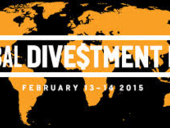Despite that some constructive proposals have been put forward at the new round of climate negotiations that is currently taking place in Geneva, Switzerland, a growing number of citizens are getting tired of these never ending talks. This is the reason why some citizens and businessmen have decided to take the lead themselves and are now calling for divestment.
Climate negotiations must clearly speed up and increase in ambition if we want to get the chance to limit global warming well below the 2°C target. Scientists have shown that in order to reach the globally agreed goal of limiting global warming to 2°C, we must quickly and drastically reduce our CO2 emissions. This is exactly why the latest IPCC report tells us that two thirds of the world����s current fossil fuel reserves must stay in the ground and not be burnt by fossil fuel companies.
The divestment movement ���� originally initiated by the NGO 350.org but quickly joined by several other NGOs across the globe ���� wants to encourage all possible actors to stop financing the development of fossil fuels and help pushing the energy transition forward. It therefore calls on universities, pension funds, churches, municipalities, banks and other financial actors to pull out (i.e. ����divest����) their money from fossil fuel companies. The movement is now getting bigger and bigger and several groups, institutions and individuals have taken the pledge.
Today and tomorrow is ����Global Divestment Day����. As you can already see online, many actions are taking place all over Europe and beyond. The Greens in the Parliament strongly support this citizens���� movement.
These 13th/ 14th February do not miss the opportunity to make the energy transition a reality.
Together we can switch the power. So let����s divest!
*****
Find out what global divestment day is all about in this short video from 350.org and����join in!
Together with the European Green Party, the group has created some material in many different EU languages as well as short explanatory leaflets on the carbon bubble. You can share them all on Facebook or on twitter.
